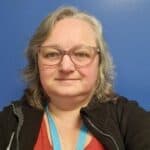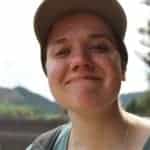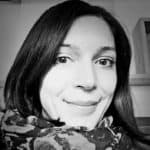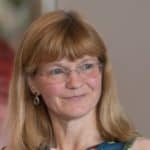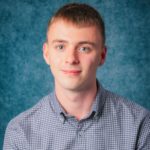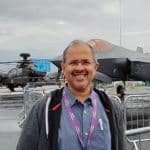Profile
Kirsty Lindsay
I'm going on a parabolic flight next week- MicroG here I come!
-
About Me:
I research how to look after astronauts in space, how to look after patients on Earth run a physiotherapy clinic and teach students physios. I like chocolate.
-
Read more
- I live in the North East of England. It’s quite windy here.
- I like chocolate brownie and ice cream. I don’t like chocomint icecream- it’s like cold toothpaste- yuck!
- I’m one of the space scientists featured in the Life Centre, Newcastle.
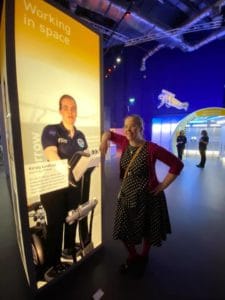
- My job title at Northumbria University is Assistant Professor in Rehabilitation Sciences.
- I like to spin wool from sheep fleeces- I wash them, card them (which is brushing them to get the tangles out) and then spin the fibres into yarn using my spinning wheel. I haven’t made anything with the yarn yet, I usually give it to my friends as gifts. I like to crochet and sew too.
- I like wearing funky legging when I work out- I have leggings with rockets, rainbows, dinosaurs and cake so far.
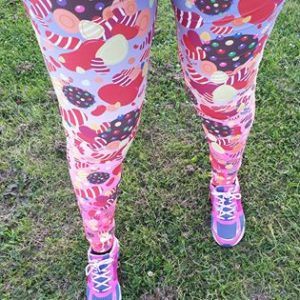
-
My pronouns are:
She/her
-
My Work:
I research how to keep astronauts healthy in space
-
Read more
I’m an Aerospace Physiologist and Physiotherapist. I study how people’s bodies change when they go into space. Then I try to find better ways to make then feel better on Earth. Mostly I study backs and spines.
In 2019 I worked on a big international bed rest study called AGBRESA. 24 people stayed in bed for 2 months so that we could simulate what happens in the body after being in space. Once they were all standing up again I spent 2 weeks doing a special back exercise with them on my research machine called FRED. FRED stands for the Functional Re-adaptive Exercise Device. It’s a fancy cross trainer.
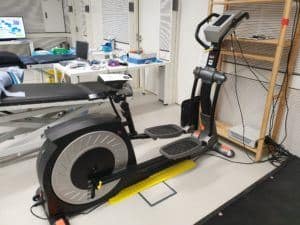
I measured how 2 muscles changed size. One muscle is called Lumbar Multifidus, which is next to your spine and the other muscle is called Transverus Abdominus (which is the first layer of muscle around your stomach, about where your belly button is). These muscles work hard to keep us upright against gravity, so when we lay down for a long time they get weak and stop working as well. The ultrasound shows a picture of what is inside the body, just like the ones pregnant ladies have to see their baby. Here I am practising in the lab- we practice every part of our experiment over and over again so that when we are in the lab getting the data for real we do it right every time.
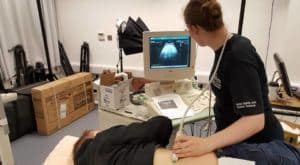
-
My Typical Day:
Monday-Thursday I run and musculoskeletal Physiotherapy clinic, where I teaach students how to be physios while treating real patients.
On Friday I work on my computer a lot when I’m not in the lab collecting data.
I write about my research,
I draw graphs and do lots of statistics, which a kind of maths.
I have a meeting with my team,usually on Teams!
I teach students about how exercise can help our bodies get better for illness and injuries.
When I collect data I use lots of cool equipment like ultrasound machines, force plates and special cameras that track movement. -
Read more
I work in clinic, so we have a staff meeting in the morning, then we see patients. we always try to get at least 1 cup of tea during the day!
I use Excel and Word a lot. I also use special programs like SPSS ( which does statistics) to help with my work.
In the afternoon we normally have team meeting- sometimes about science, sometimes about teaching, sometimes with people in different countries. There is always someone interesting to listen to!
When I don’t have anything specific to do I like to make sure I’m still learning, so I do courses about the body, physiotherapy, I read new science articles to learn about what other people are doing, and I do outreach- like this!
-
What I'd do with the prize money:
I’d use the prize money to do safe science experiments with very young children (3-5) and children with special educational needs because sometimes these groups get forgotten and science should be for everyone
-
Education:
Bewbush First and Middle School,
St Peter’s C of E Primary School,
Millais,
The College of Richard Collyer,
The No1 School of Technical Training,
The Open University,
York St John University,
King’s College London,
Northumbria University. -
Qualifications:
12 GSCEs (7 A’s, 3 B’s and 2 C’s),
AS Geology, Physics and Media Studies,
Certificate in Business Language Competence Spanish,
Advanced Modern Apprenticeship in Aviation,
Certificate in Human Biology,
BHSc (Hons) Physiotherapy,
MSc Space Physiology and Health,
PhD in Sports, Exercise and Rehabilitation. -
Work History:
Propulsion Engineering Technician,
Outdoor First aider,
Restaurant Kitchen Assistant,
Sports Clinic Receptionist,
Rugby Physio,
Wilcos Sales Assistant,
Insurance long-term Clams Advisor (Australia),
Research assistant in trauma, maternity and heart clinic,
Outpatient Physiotherapist,
Exam Invigilator,
ESA Young Graduate Trainee/ Project Science Officer,
Next Sales Assistant,
Volunteer Public Engagement Officer, Science Museum,
PhD student,
Aerospace Medicine Research Assistant,
Science Demonstrator.Assistant Professor
-
Current Job:
I’m and assistant professor of rehabilitation science, and the clinical lead for the Northumbria Physiotherapy student-led clinic.
-
Employer:
Northumbria University
-
My Interview
-
How would you describe yourself in 3 words?
space-loving nerd
What did you want to be after you left school?
As Astronaut
Were you ever in trouble at school?
Nope
Who is your favourite singer or band?
I like The How to Train Your Dragon film score
What's your favourite food?
chocolate brownie
If you had 3 wishes for yourself what would they be? - be honest!
perfect health for everyone, a chance to go into space and enough money to tavel
Tell us a joke.
What is big and red and doesn't fit down rabbit holes? A fire engine
-

